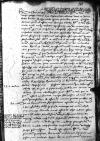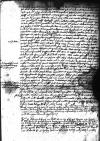Binas his diebus a Reverendissima Dominatione Vestra litteras accepi, quarum ⌊⌋ 24 Septembris, ⌊⌋ vero 7 huius datae erant. Respondebo igitur prioribus prius. Causa domus, quam ab affini meo ⌊Georgio Scholtz⌋ Reverendissima Dominatio Vestra ⌊Thoroniae⌋ emit, mihi videtur aequissima, ita ut mirari satis nequeam, quod in ea emptione ⌊magistratus
Thoronensis⌋ Reverendissimam Dominationem Vestram impedire conetur, cum hoc iam apud illos usitatum et non semel istiusmodi emptiones admissas esse reperiatur. Quare persuadeat sibi Reverendissima Dominatio Vestra me in ea causa illi non defuturum sed omnem adhibiturum diligentiam, ne hic contractus inter Reverendissimam Dominationem Vestram et ⌊affinem meum⌋ irritus fiat idque iam partim in superiore Graudentino ⌊harum terrarum conventu⌋ curassem, si per valetudinem eo me conferre potuissem. Et quoniam nondum intellexi causam hanc in eo ⌊conventu⌋ propositam fuisse, integra mihi adhuc reservata est in futuro conventu eius mentionem faciendi et Reverendissimae Dominationis Vestrae affinisque mei defendendi opportunitas et facultas. Quam pro meo in ⌊Reverendissimam Dominationem Vestram⌋ studio non negligam, quando ipsa quoque, ne sibi et ⌊affini meo⌋ desit, providebit.
De canonicatu ⌊ecclesiae suae Wladislaviensis⌋, qui olim morte ⌊Stanislai Rzeczicza⌋ poenitentiarii in Romana Curia vacuus factus nepoti meo ⌊Gaspari Hannovio⌋ iuris utriusque doctore on the margin⌈iuris utriusque doctoreiuris utriusque doctore on the margin⌉, per ⌊Sedem Apostolicam⌋ collatus est, de quo in ⌊⌋ scribit, rem ita cum eo communicavi. Is cum intellexisset, quas Reverendissima Dominatio Vestra pro eo canonicatu offert condiciones, nempe Gdanensem ad Divam Virginem parochialem et officialis munus, gratias quidem illi una mecum on the margin, in the hand of Johann Lehmann⌈una mecumuna mecum on the margin, in the hand of Johann Lehmann⌉ pro ea benevolentiae significatione agendas censuit. Verum a parochialibus ecclesiis, quod iis sit animarum ars artium, id est cura animarum coniuncta, et ab officialis, id est iudicis, officio, quo nihil itidem periculosius praesertim hoc tempore, cum status et condicio rerum ecclesiasticarum adeo apud eos homines viluerit, ut neque divina, neque humana iura sine contemptu apud eos habeantur on the margin, in the hand of Johann Lehmann⌈praesertim hoc tempore, cum status et condicio rerum ecclesiasticarum adeo apud eos homines viluerit, ut neque divina, neque humana iura sine contemptu apud eos habeanturpraesertim hoc tempore, cum status et condicio rerum ecclesiasticarum adeo apud eos homines viluerit, ut neque divina, neque humana iura sine contemptu apud eos habeantur on the margin, in the hand of Johann Lehmann⌉, ita superinscribed in place of crossed-out adeo⌈adeo ita ita superinscribed in place of crossed-out adeo⌉ se abhorrere dixit, ut nequicquam in vita magis sibi fugiendum statuerit ob idque, dum novem annis in ⌊Urbe⌋ egerat, multarum parochialium in ⌊Polonia⌋ et alibi adipiscendarum occasionem studio volensque semper praetermisisset. Proinde, etsi cuperet Reverendissimae Dominationi Vestrae plurimum gratificari, has tamen condiciones suscipere nec posset, nec auderet.
Quam hac in re sententiam eius cum  AAWO, AB, D.70, f. 386v audissem, non potui non probare. Est enim certe animarum sollicitudo et iudicis provincia superinscribed in place of crossed-out officium⌈officium provincia provincia superinscribed in place of crossed-out officium⌉ onus summum ac multis written over orum⌈orumisis written over orum⌉que adscribed⌈queque adscribed⌉ periculis written over orum⌈orumisis written over orum⌉ plenum. At si quid aliud fuisset, quod huiusmodi onere vacuum, aequam etiam haberet opimi huius sacerdotii compensationem, melius et nepos superinscribed⌈et ⌊nepos⌋et nepos superinscribed⌉, quid sibi superinscribed in place of crossed-out nepoti⌈nepoti sibi sibi superinscribed in place of crossed-out nepoti⌉ sequendum, nepos et ego, quid illi suadendum esset, considerare potuissemus, quamquam tamen ipsemet post potius hunc canonicatum possidere cupiat, cum ideo, quod nativae suae ⌊dioecesis⌋ sit, tum quod in ea ecclesia, dum nuper transisset, vehementer sibi placuerint omnia.
AAWO, AB, D.70, f. 386v audissem, non potui non probare. Est enim certe animarum sollicitudo et iudicis provincia superinscribed in place of crossed-out officium⌈officium provincia provincia superinscribed in place of crossed-out officium⌉ onus summum ac multis written over orum⌈orumisis written over orum⌉que adscribed⌈queque adscribed⌉ periculis written over orum⌈orumisis written over orum⌉ plenum. At si quid aliud fuisset, quod huiusmodi onere vacuum, aequam etiam haberet opimi huius sacerdotii compensationem, melius et nepos superinscribed⌈et ⌊nepos⌋et nepos superinscribed⌉, quid sibi superinscribed in place of crossed-out nepoti⌈nepoti sibi sibi superinscribed in place of crossed-out nepoti⌉ sequendum, nepos et ego, quid illi suadendum esset, considerare potuissemus, quamquam tamen ipsemet post potius hunc canonicatum possidere cupiat, cum ideo, quod nativae suae ⌊dioecesis⌋ sit, tum quod in ea ecclesia, dum nuper transisset, vehementer sibi placuerint omnia.
Peto itaque a Reverendissima Dominatione Vestra maiorem in modum, ut cum idem ⌊nepos⌋ propinquitatis iure aliisque de causis mihi superinscribed⌈mihimihi superinscribed⌉ non vulgariter carus sit diplomataque apostolica certissima et efficacissima habeat et tantopere nativam ecclesiam suam amet hanc ⌊Wladislaviensem ecclesiam⌋ ceu eam, sub qua natus est, amet, ut inquam, illum sive doctoris, quo et ab antecessore suo ⌊Rzeczicza⌋ idem canonicatus semper possessus est sine nobilitatis aut alio quovis titulo, ea facilitate on the margin⌈ea facilitateea facilitate on the margin⌉ in possessionem venire sinat faciatque, ut et ⌊Sedis Apostolicae⌋ litteris, prout par est on the margin⌈prout par estprout par est on the margin⌉, libenter suo cum ⌊capitulo⌋ obtemperare et mihi pro ⌊nepoti⌋ diligenter scribenti gratificari voluisse videatur, cum ipse maxime cupiam Reverendissimae Dominationi Vestrae gratificari et obsequi in omnibus, ut etiam quempiam sanguinis mei apud ecclesiam Reverendissimae Dominationis Vestrae, qui hoc praestet, habeam on the margin, in the hand of Johann Lehmann⌈cum ipse superinscribed⌈ipseipse superinscribed⌉ maxime cupiam Reverendissimae Dominationi Vestrae gratificari et obsequi in omnibus, ut etiam superinscribed⌈etiametiam superinscribed⌉ quempiam sanguinis mei apud ecclesiam Reverendissimae Dominationis Vestrae, qui hoc praestet, habeamcum ipse maxime cupiam Reverendissimae Dominationi Vestrae gratificari et obsequi in omnibus, ut etiam quempiam sanguinis mei apud ecclesiam Reverendissimae Dominationis Vestrae, qui hoc praestet, habeam on the margin, in the hand of Johann Lehmann⌉. Id quod mihi vehementer gratum futurum ac mutuis benevolentiae officiis semper compensandum statuam.
De ipso ⌊nepote meo⌋ hoc etiam on the margin⌈hoc etiamhoc etiam on the margin⌉ promittere etiam non dubito habituram in eo Reverendissimam Dominationem Vestram canonicum, cui prae ceteris favisse et opem sua auctoritate tulisse numquam poenitebit. Rediturus est ⌊Wladislaviam⌋ petendae possessionis ergo, cum ad has meas litteras Reverendissima Dominatio Vestra responderit, ut prius hinc, quae sit eiusdem voluntas quidque apud se mea ista commendatio ponderis habuerit on the margin⌈quidque apud se mea ista commendatio ponderis habueritquidque apud se mea ista commendatio ponderis habuerit on the margin⌉, exactius ambo cognoscamus. ⌊Eum⌋ igitur ut tum omnibus modis adiutum velit, iterum atque iterum impense rogo.
Dominus Iesus incolumem florentemque perpetuo servet Reverendissimam Dominationem Vestram. Cui me, ⌊nepotis⌋que mei negotium istud et honestum, et aequum studiosissime et intime commendo.
Causa domus, quam ab affini meo, ⌊Georgio Schultz superinscribed⌈Georgio SchultzGeorgio Schultz superinscribed⌉⌋, Reverendissima Dominatio Vestra ⌊Thoroniae⌋ emit, mihi videtur aequissimam, ita ut mirari satis nequeam, quod in ea emptione ⌊magistratus Thorunensis⌋ Reverendissimam Dominationem Vestram superinscribed in place of crossed-out eandem⌈eandem Reverendissimam Dominationem Vestram Reverendissimam Dominationem Vestram superinscribed in place of crossed-out eandem⌉ impedire conetur superinscribed in place of crossed-out conentur⌈conentur conetur conetur superinscribed in place of crossed-out conentur⌉, cum hoc iam apud illos receptum sit superinscribed⌈sitsit superinscribed⌉ et non semel huiusmodi venditiones admissae sint.
Quare persuadeat sibi Reverendissima Dominatio Vestra me superinscribed in place of crossed-out nos⌈nos me me superinscribed in place of crossed-out nos⌉ in illa causa ei non defuturum, sed omnem adhib stain⌈[] stain⌉eam adhibiturus sum diligentiam, ne hic contractus inter Reverendissimam Dominationem Vestram et affinem meum imped irritus fiat irritus, idque fortassis iam partim in superiori Graudentino ⌊harum terrarum conventu⌋ cu AAWO, AB, D.70, f. 385vrassem, si illi ob adversam valetudinem mihi interesse licuisset. Verum, cum sciam illam necdum ibi superinscribed⌈ibiibi superinscribed⌉ coram dominis ⌊harum terrarum consiliariis⌋ esse propositam, erit servata mihi est integra eius in futuro conventu mentionem faciendi et partes Reverendissimae Dominationis Vestrae et ⌊affinis⌋ mei defendendi, utque R nec ipsa sibi, nec affini meo desit Reverendissima Dominatio Vestra, plurimum rogo.
AAWO, AB, D.70, f. 385vrassem, si illi ob adversam valetudinem mihi interesse licuisset. Verum, cum sciam illam necdum ibi superinscribed⌈ibiibi superinscribed⌉ coram dominis ⌊harum terrarum consiliariis⌋ esse propositam, erit servata mihi est integra eius in futuro conventu mentionem faciendi et partes Reverendissimae Dominationis Vestrae et ⌊affinis⌋ mei defendendi, utque R nec ipsa sibi, nec affini meo desit Reverendissima Dominatio Vestra, plurimum rogo.
Cui cupio esse commendatissimus atque eandem felicissime cum omnium rerum successu valere opto.
 AAWO, AB, D.70, f. 386v audissem, non potui non probare. Est enim certe animarum sollicitudo et iudicis provincia superinscribed in place of crossed-out officium⌈officium provincia provincia superinscribed in place of crossed-out officium⌉ onus summum ac multis written over orum⌈orumisis written over orum⌉que adscribed⌈queque adscribed⌉ periculis written over orum⌈orumisis written over orum⌉ plenum. At si quid aliud fuisset, quod huiusmodi onere vacuum, aequam etiam haberet opimi huius sacerdotii compensationem, melius et nepos superinscribed⌈et
AAWO, AB, D.70, f. 386v audissem, non potui non probare. Est enim certe animarum sollicitudo et iudicis provincia superinscribed in place of crossed-out officium⌈officium provincia provincia superinscribed in place of crossed-out officium⌉ onus summum ac multis written over orum⌈orumisis written over orum⌉que adscribed⌈queque adscribed⌉ periculis written over orum⌈orumisis written over orum⌉ plenum. At si quid aliud fuisset, quod huiusmodi onere vacuum, aequam etiam haberet opimi huius sacerdotii compensationem, melius et nepos superinscribed⌈et  AAWO, AB, D.70, f. 385vrassem, si illi ob adversam valetudinem mihi interesse licuisset. Verum, cum sciam illam necdum ibi superinscribed⌈ibiibi superinscribed⌉ coram dominis
AAWO, AB, D.70, f. 385vrassem, si illi ob adversam valetudinem mihi interesse licuisset. Verum, cum sciam illam necdum ibi superinscribed⌈ibiibi superinscribed⌉ coram dominis 

